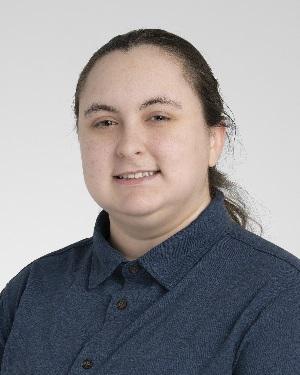Research Technology & Services
Proteomics & Metabolomics Core
-
Proteomics & Metabolomics Core
- About
- Services
- Equipment
- Policies & Procedures
- Frequently Asked Questions
- Grant & Publications
- Acknowledgment Guidance
About Us
Lerner Research Institute's Proteomics & Metabolomics Core uses advanced mass spectrometry methods for the sequencing of proteins and the analysis of small molecules. The goal of the Core is to help investigators with the qualitative and quantitative characterization of proteins and small molecules in biological matrices such as plasma/serum, urine, feces, saliva, tissues, and cell lines. The proteomics applications include the identification of protein from gel bands, from magnetic beads, or in-solution, identification and quantitation of post-translational modifications, and the global quantitative analysis of proteomes and post-translational modifications. The metabolomics applications include both targeted and untargeted profiling of metabolites.
The Core serves as a resource to investigators at Cleveland Clinic as well as external investigators. Services are offered in a fee-for-service manner but in specific cases the Core may enter into collaborative arrangements providing valuable input on grant applications and study design.
All investigators considering either Proteomic or Metabolomic experiments are encouraged to contact Dr. Belinda Willard at 216.444.7170.
Metabolomics
The Metabolomics Core is equipped with a state-of-the-art tandem mass spectrometry systems that are dedicated to the analysis of small molecule metabolites. The Core can carry out both targeted and untargeted metabolomic experiments. The core operates on both a fee-for-service basis and an independent use basis. For all experiments, we ask that investigators initially consult with Core personnel prior to sample submission. Every experimental step from sample preparation to data analysis is performed by Core personnel. Alternatively, investigators can be trained to prepare the samples, operate the instrument and perform data analysis. Expert technical assistance tailored to meet the needs of investigators in all aspects of the studies can be provided for investigators who are either novices or knowledgeable in mass spectrometry applications. This includes advice in methods of appropriate sample storage and preparation, and assistance in HPLC or LC-MS/MS based method development. The Core has off-line data analysis stations configured with data analysis programs including Compound Discover, XCMS and MSDial for untargeted analysis and TraceFinder for targeted analysis.
Proteomics
The Proteomics Core is a protein sequencing facility that uses tandem mass spectrometry methods to sequence and identify proteins. The Core is equipped with three nano-flow HPLC electrospray ionization-ion trap mass spectrometry systems including a high resolution ThermoScientific Exploris 480, a ThermoScientific Fusion Lumos, and a Bruker TimsTOF Pro2. These instruments are dedicated to high sensitivity peptide analyses. The Core routinely analyzes gel separated proteins, proteins in-solution, and protein enriched on magnetic beads. The Core provides several proteomic services including protein identification, protein quantitation, post-translational modification analysis including quantitation, and cross-linking mass spectrometry experiments. The workflow of the lab includes sample digestion, liquid chromatography tandem mass spectrometry, data analysis, and a written report is provided for all samples. The turnaround time for most samples is three to four weeks. The Core has off-line data analysis stations and several database search programs including Proteome Discoverer, MSFragger, MaxQuant, Scaffold and Spectronaut that facilitate both the identification and quantitation experiments. The Proteomics Core is partly supported by the Case Comprehensive Cancer Center.
To recognize the Proteomics and Metabolomics Core personnel or technology for support of your research, please refer to the Acknowledgment Guidance tab.
Contacts








Renliang Zhang, MD, PhD
Staff Scientist

Services
Metabolomics Services:
- Targeted metabolomics and lipidomics
- Some panels that are available include TCA cycle, amino acids, fatty acids, oxidized fatty acids, ceramides, short chain fatty acids, and sterols.
- Core also develops targeted metabolomics methods as needed
- Untargeted metabolomics and lipidomics
- LC-MS based method metabolomics using one or two types of column chromatography
- GC-MS based untargeted metabolomics
- MW analysis
Proteomic Services:
- Protein identification from proteins isolated on an SDS-Page gel, in-solution, or on-bead
- Post-translational modification analysis
- Single protein modification analysis
- Global enrichment methods for pS/pT, pY, acetyl-K, and ubiquitination
- Large scale quantitative proteomics for both proteins and Post-translational modifications
- Label free based DDA, Label free based DIA, SILAC, and isobaric tagging methods are supported
- Targeted proteomics
Equipment
This high resolution nano-flow LC-MS system is used for protein identification, post-translational modification analysis, Label free and isobaric tagging based quantitative proteomic experiments.
This high resolution nano-flow LC-MS system is used for protein identification, post-translational modification analysis, Label free and isobaric tagging based proteomic experiments, and cross-linking studies.The Fusion Lumos instrument was purchased via an NIH shared instrument grant, 1S10OD023436-01.
This high resolution nano-flow LC-MS system is used for protein identification, post-translational modification analysis, and DIA based Label free protein quantitation. The timsTof Pro2 instrument was purchased via an NIH shared instrument grant, S10 OD030398.
This high resolution LC-MS system is used for untargeted or global metabolite profiling which is an unbiased evaluation of all ions in a pre-defined mass range (i.e. 60-850 Da).
This high resolution GC-MS system is used for targeted and untargeted metabolite profiling.
This triple quadrupole LC-MS system is used for targeted compound quantification utilizing Multiple Reaction monitoring (MRM).
This triple quadrupole GC-MS system is used for targeted compound quantification utilizing Multiple Reaction monitoring (MRM).
This single quadrupole GC-MS system is used for targeted compound quantification.
Policies & Procedures
Proteomics
The Proteomics & Metabolomics Core will accept samples from any institution. All investigators are strongly encouraged to discuss their project prior to sample submission with Dr. Belinda Willard (216.444.7170).
For gel based proteomic experiments, we ask that the entire gel be submitted. The gel can be submitted wet, equilibrated into either water or 5% acetic acid in water. The Core can analyze both Coomassie Blue and silver stained gels. We recommend using Coomassie Blue whenever possible.
For in-solution and on-bead digestions, please submit the sample with a complete description of buffer and protein amounts if known. For on-bead digestions, the best results are obtained using magnetic beads.
For protein specific modification analysis, we prefer for the samples to be submitted in-gel which facilitates utilization of multiple proteases.
For global modification enrichment or global proteomics experiments, we prefer submission of cell pellets or tissue samples directly.
For all experiments, please describe the sample in as much detail as possible, including the species that it was isolated from, a brief description of how the protein was isolated, and a brief description of the purpose of the experiment.
Written reports are made for all analyses. Typical turnaround time, from submission of sample to preparation of report, is approximately three to four weeks.
Links
- The American Society for Mass Spectrometry (ASMS)
- The Association of Biomolecular Resource Facilities (ABRF)
- Protein Prospector
- ExPASy Proteomics
- PhosphoSite
- Phosida-Posttranslational Modification Database
- Peptide Atlas
- GPMDP Database
Metabolomics
Metabolomics can be broadly divided into two main approaches, untargeted and targeted. Untargeted or global metabolite profiling is an unbiased evaluation of all ions in a pre-defined mass range (i.e. 60-850 Da). This is a hypothesis generating approach and is ideal for biomarker discovery or identification of unknown metabolic pathways. Untargeted metabolomics requires high mass accuracy instrumentation and strong bioinformatics support to mine such high-throughput data.
For these experiments, it is highly recommended that you meet with our staff when designing these experiments. This will help ensure proper experimental design and scheduling of instrument time.
Targeted approaches are highly quantitative on a few selected and known molecules using internal standards. A list of metabolites that can be quantified in the core is available upon request.
Our Shared Lab Resources are equipped with top-of-the-line instruments and offers comprehensive services in both targeted and untargeted metabolomics as well as statistical analysis and bioinformatics.
Please consult with staff about your experiments to determine feasibility of the experiments, determine if a new method needs to be developed and schedule instrument time.
Links
Frequently Asked Questions
- What is LC/MS?
This abbreviation stands for Liquid Chromatography/Mass Spectrometry. LC or HPLC is used for separation of substances based on specific physical properties such as hydrophobicity or charge. The mass spectrometer is the detector which measures mass to charge ratio (m/z) which can be used to determine molecular weight. This technique is considered the most sensitive and accurate for the detection of substances.
- What is LC/MS-MS?
This abbreviation stands for Liquid Chromatography on-line Tandem Mass Spectrometry. The MS spectra contains enough information to determine molecular weight but does not give information regarding structure. Due to this, many mass spectrometric methods utilize tandem mass spectrometry or MS/MS. In these experiments, the molecule of interest is isolated and subjected to fragmentation. The resulting fragment ion spectrum, MS/MS spectra, contains information on the structure of the compound. For peptides, this spectrum can be used to determine the amino acid sequence of the peptide allowing for protein identification. For targeted metabolomics, the combination of the specific parent mass and the unique fragment pattern is used to selectively monitor and quantify the compound of interest in a robust, versatile and high-throughput manner. Compared to LC/MS, LC/MS/MS method is much more specific and sensitive for quantitation of small molecules (100-2000 Da).
- Can endogenous compounds (< 2000 Da) and drugs be quantified in biological samples like plasma/serum using LC/MS or LC/MS/MS?
Yes.
- Can novel compound in biological samples be identified using LC/MS/MS?
Yes, if the quantity of the compound is enough in biological samples.
- How much protein do I need for identification?
Current LC-MS systems can identify at silver staining levels.
- What is the turnaround time?
Our goal is to be able to provide preliminary data within three weeks and a written report within four weeks.
- Can I identify post-translational modifications?
Post-translational modifications can be identified by mass spectrometry; however these experiments generally require more protein than the identification experiments. This is especially true for modifications that are sub-stoichiometric in nature. One of the inherent difficulties in these types of analysis is identifying a low abundant modified peptide present in a complex peptide mixture. Several different strategies can be used to increase the likelihood of success in these experiments including large amounts of protein, increasing the stoichiometry of the modification reactions, using targeted analysis and multiple proteases.
- Can the amounts of my protein or post-translational modification be quantified?
Relative quantities of proteins and post-translational modifications can be determined in these experiments. This can be done using label free or isotopically labeled methods (SILAC, iTRAQ, TMT). Absolute quantities of proteins and post-translational modifications can be determined in these experiments. In order to achieve this, an internal standard must be utilized.
Grant & Publications
The Proteomics and Metabolomics Core is directed by Belinda Willard, PhD, an expert in the use of mass spectrometry in the study of biological systems. Dr. Willard has directed the Lerner Research Institute Proteomics Core laboratory since 2008, become involved in the Metabolomics Core in 2014 and is highly experienced in the operation of multiple mass spectrometry systems including high-resolution orbitrap instruments, tandem quadrupole instruments, ion trap instruments and time-of-flight instruments.
The Proteomics Core is a protein sequencing facility that uses tandem mass spectrometry methods to sequence and identify proteins. The Core is equipped with three capillary column HPLC electrospray ionization-ion trap mass spectrometry systems, a high resolution ThermoScientific Exploris 480, a ThermoScientific Fusion Lumos, and a Bruker TimsTOF Pro 2 instrument. These instruments are dedicated to high sensitivity peptide analyses. The Core routinely analyzes proteins isolated in gels, isolated on magnetic beads, or proteins submitted for in-solution. The Core provides several proteomic services including protein identification, protein quantitation, and post-translational modification analysis including quantitation. The workflow of the lab includes sample digestion, liquid chromatography tandem mass spectrometry, data analysis, and a written report is provided for all samples. The turnaround time for most samples is three weeks, but is longer for larger experiments. The laboratory has off-line data analysis stations and several database search programs including Proteome Discoverer, MSFragger, Scaffold, MaxQuant, and Spectronaut that facilitate both the identification and quantitation experiments.
The Fusion Lumos (S10 OD023436) and Bruker TimsTof Pro2 (S10 OD030398) instruments were purchased with a NIH S10 grant. Per NIH requirements, please acknowledge these shared instrument grant in publications with data from these instrument.
The Fusion Lumos instrument was purchased via an NIH shared instrument grant, S10 OD023436.
The timsTof Pro2 instrument was purchased via an NIH shared instrument grant, S10 OD030398.
The Metabolomics Core provides a resource for both the targeted and untargeted quantitation of metabolites from a number of biological matrices such as plasma, serum, feces, urine, tissue homogenates and cell lysates. For untargeted metabolomic experiments two different high resolution instruments are available including a ThermoScientific Q-Exactive HF which is used for liquid chromatography based untargeted metabolomic experiments and a ThermoScientific Q-Exactive GC-MS which is used for gas chromatography based untargeted metabolomic experiments. The core has access to several software solutions for untargeted data analysis including TraceFinder, Compound Discoverer, XCMS, and MetaboLyzer.
For targeted metabolomic experiments two different triple quadrupole experiments are available including a ThermoScientific Quantiva which is used for liquid chromatography based targeted metabolomic experiments amd a ThermoScientific Evo which is used for gas chromatography based targeted metabolomic experiments. The core has access to several software solutions for targeted data analysis including TraceFinder, Skyline, and Xcaliber. The core has targeted metabolomic methods in place for several metabolites but can also perform method development for any metabolite that is of interest to investigators.
Investigators are asked to meet with Dr. Willard along with other relevant core personnel prior to submission of samples in order to plan the experiment to best meet the experimental goals of the project. The Core operates on either a fee-for-service or a collaborative basis. The fee-for-service experiments include sample preparation, data acquisition, data analysis, and submission of a written report to the investigator by core personnel. The turn-around time for these experiments is 2-6 weeks from sample submission depending on instrument availability and the size of the project. Larger projects take a longer time to complete. Collaborative projects typically involve investigators performing one or both of the sample preparation or data analysis steps. All investigators are trained by core staff prior to a collaborative project.
Acknowledgment Guidance
Acknowledgments and Authorship
All work performed by Cleveland Clinic Shared Laboratory Resources should be acknowledged or considered for co-authorship in scholarly publications, presentations, and posters. By acknowledging shared resource expertise and instrumentation, you play a critical role in supporting our mission to maintain access to cutting-edge technology and services on our campus into the future.
The Cleveland Clinic Shared Laboratory Resources participate in the Research Resource Identifier Initiative to promote transparency and reproducibility of scientific methods. Please include the unique Research Resource Identifier, RRID number, in the Methods or Acknowledgements sections of your manuscripts.
Example Acknowledgments:
- We acknowledge the Cleveland Clinic Research Proteomics and Metabolomics Core Facility (RRID:SCR_026563), especially [staff name], for their assistance with [technique/technology]
- This research was supported in part by Cleveland Clinic Research Proteomics and Metabolomics Shared Laboratory Resource (Cleveland, OH) (RRID:SCR_026563).
- This work was supported by NIH Shared Instrument S10 Grant S10OD023436-01 for the Thermo Scientific Fusion Lumos LC-MS/MS.
- This work was supported by NIH Shared Instrument S10 Grant S100D030398-01 for the Quadrupole Time of Flight LC-MS.
- This work was supported by NIH Shared Instrument S10 Grant S10RR031537-01for the LTQ-Orbitrap Velos.
Getting Started
View prices and request services through iLab. Register for an iLab account and visit the desired core's page to get started.
Questions? Contact Us